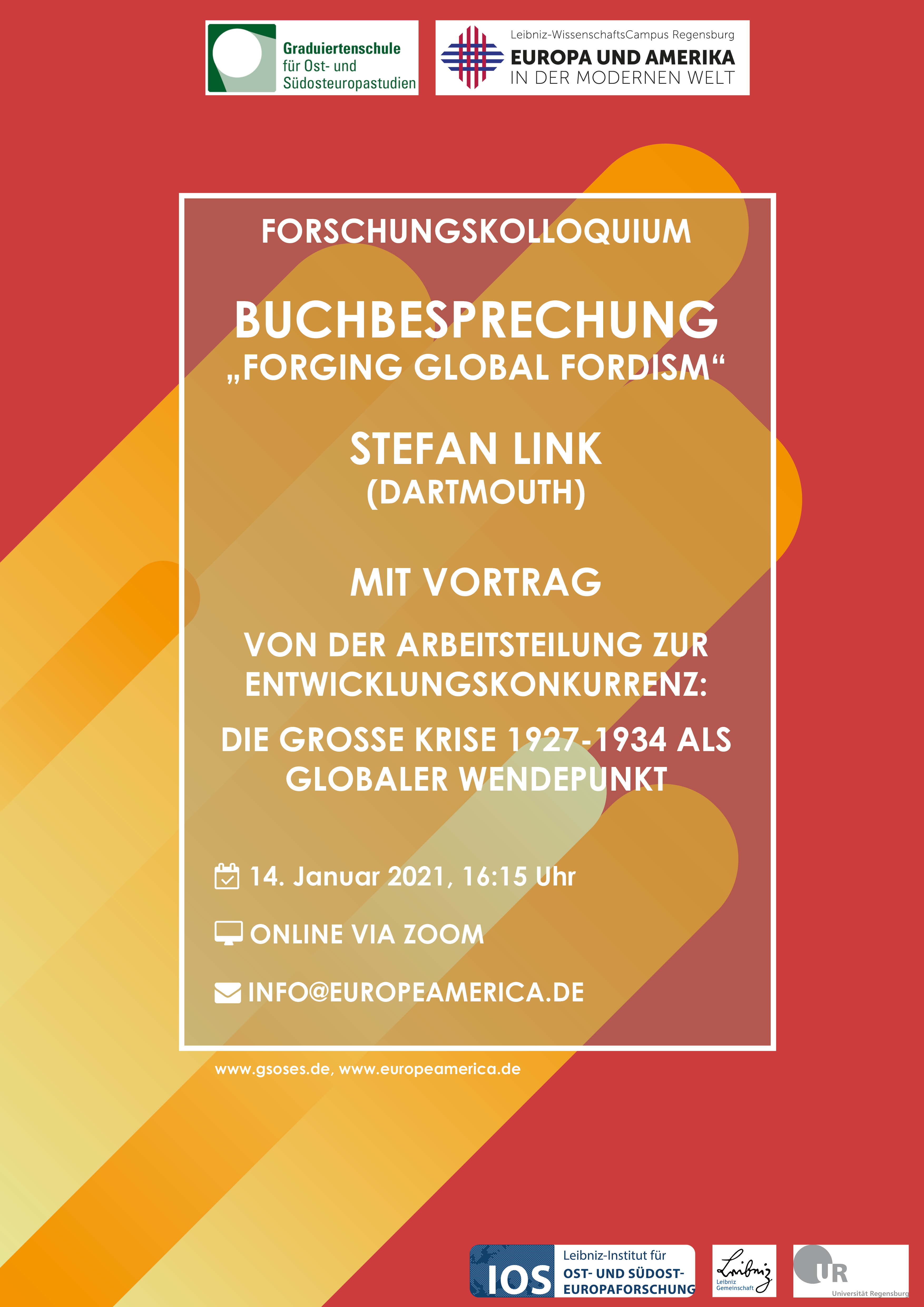Research Colloquium: Forging Global Fordism (Stefan Link)
In third session of this semester's Research Colloquium Stefan Link will discuss his book Forging Global Fordism: Nazi Germany, Soviet Russia, and the Contest over the Industrial Order (Princeton UP, 2020), in conversation with Ulf Brunnbauer. This will be accompanied by a lecture on the Great Depression as a moment of global change.
Vortrag: Von der Arbeitsteilung zur Entwicklungskonkurrenz: Die große Krise 1927-1934 als globaler Wendepunkt
In Anschluss an Karl Polanyi schlägt der Vortrag vor, die große Krise der 1930er Jahre als "Great Transformation" zu betrachten - als Wendepunkt zwischen zwei Epochen der Globalisierung. Die Weltwirtschaftsordnung des 19. Jahrhunderts war geprägt von der imperialen Arbeitsteilung zwischen westlichen Industriezentren und (semi-)kolonialen Rohstoff- und Agrarproduzenten. In Folge der Krise jedoch begann die Industrialisierung der Peripherie. Dies legte die Grundlage für die Dynamik der nationalstaatlichen Entwicklungskonkurrenz, die die Weltwirtschaftsordnung seit der zweiten Hälfte des 20. Jahrhunderts prägt.
Zum Buch
Als die USA in den ersten Jahrzehnten des 20. Jahrhunderts zu ihrer Vormachtstellung aufstieg, assoziierten Beobachter*innen aus dem Ausland die amerikanische Wirtschaftsmacht vor allem mit der wachsenden US-Autoindustrie. In den 1930ern strömten Ingenieur*innen aus der ganzen Welt nach Detroit mit der Absicht, Amerika nachzuahmen und herauszufordern. Unter ihnen waren viele Spezialist*innen aus der Sowjetunion und dem NS-Staat, die versuchten, die Techniken der amerikanischen Massenautoproduktion, auch Fordismus, zu beobachten, zu kopieren und manchmal auch zu stehlen. Forging Global Fordism verfolgt, wie Deutschland und die Sowjetunion Fordismus aufgriffen in einer Zeit, die von Wirtschaftskrisen und ideologischen Umbrüchen geprägt war.
Forging Global Fordism hinterfragt die Annahme, dass die globale Massenproduktion ein Produkt des liberalen Internationalismus der Nachkriegszeit war. Das Buch zeigt, dass die Massenproduktion bereits in den globalen 1930er Jahren begann und dass die Verbreitung des Fordismus einen ausgesprochen illiberalen Entwicklungsverlauf hatte.
Lecture: From the Division of Labour to Development Competition: The economic crisis of 1927-1934 as a global turning point
Drawing on Karl Polanyi, this lecture argues that the economic crisis of the 1930s should be considered a “Great Transformation”. It was thus a turning point between two epochs of globalization. The economic world order of the nineteenth century was shaped by an imperial division of labour between Western industrial centres and (semi-)colonial producers of raw materials and agricultural goods. One outcome of the crisis, however, was the industrialization of peripheries. This laid the foundations for the dynamics of development competition between nation states, which came to shape the economic world order of the second half of the twentieth century.
Book summary
As the United States rose to ascendancy in the first decades of the twentieth century, observers abroad associated American economic power most directly with its burgeoning automobile industry. In the 1930s, in a bid to emulate and challenge America, engineers from across the world flocked to Detroit. Chief among them were Nazi and Soviet specialists who sought to study, copy, and sometimes steal the techniques of American automotive mass production, or Fordism. Forging Global Fordism traces how Germany and the Soviet Union embraced Fordism amid widespread economic crisis and ideological turmoil.
Forging Global Fordism challenges the notion that global mass production was a product of post–World War II liberal internationalism, demonstrating how it first began in the global thirties, and how the spread of Fordism had a distinctly illiberal trajectory.
Stefan Link is associate professor of history at Dartmouth College, Hanover, New Hampshire. He specializes in economic history, business history, and the intellectual history of capitalism. He received his PhD from Harvard in 2012.
When? 14 January 2020, 16:15
Where? Zoom, https://uni-regensburg.zoom.us/j/95399378150, Meeting-ID: 953 9937 8150
The full program for the winter semester 2020/21 can be found here.

